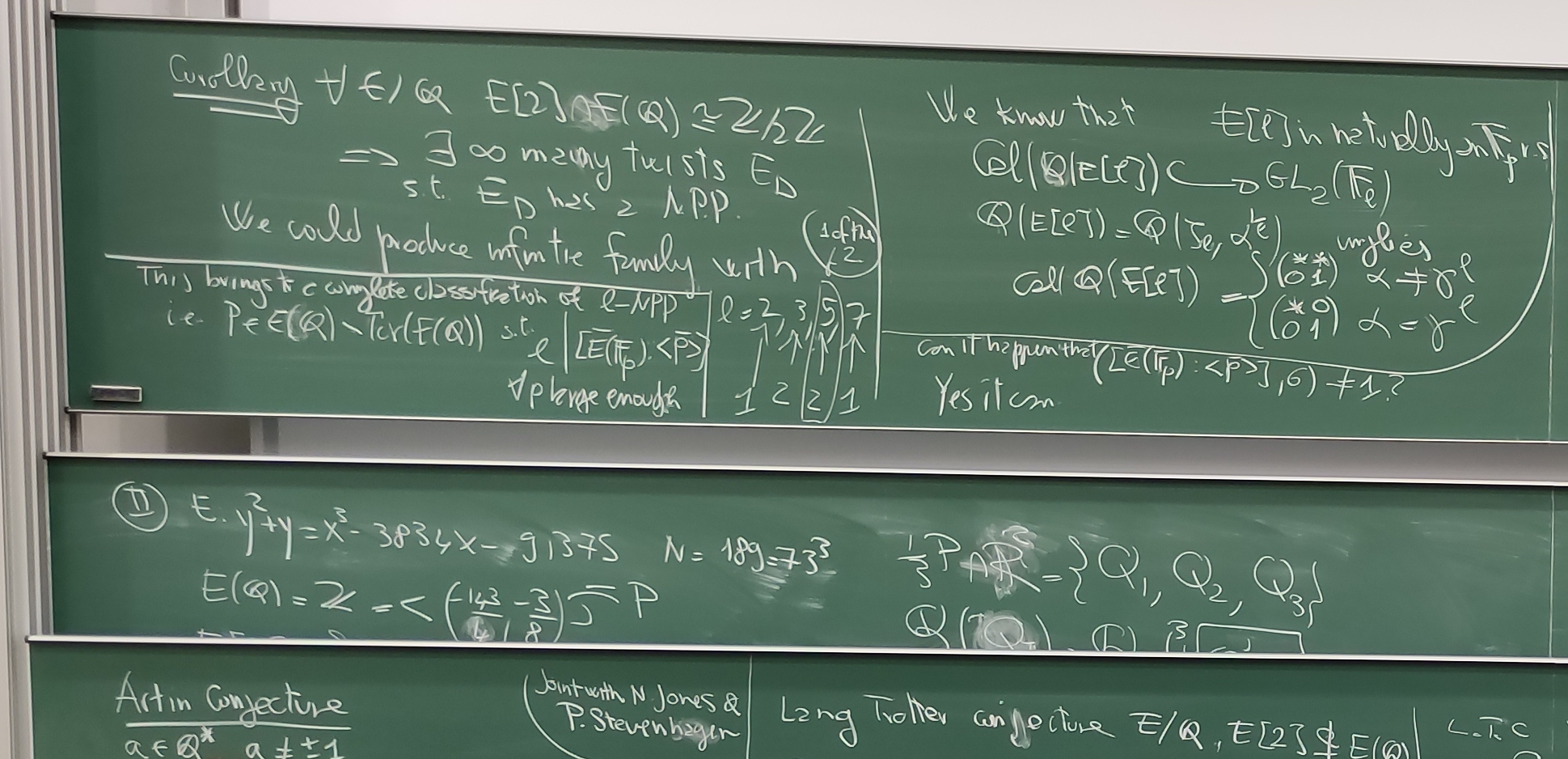
Number Theory Seminar
Schedule 2025/26
| Speaker | Title of the talk | Date | Time & place |
|---|---|---|---|
| Mike | Congruences and the Galois representations of classical cusp forms | 02.10 | 13:30, 6A |
| Mahima | Köhler's conjecture | 09.10 | 13:30, 6A |
| Gabor | Köhler's conjecture | 16.10 | 13:30, 6A |
| Thomas Lamby | Number theory meets multifractal analysis | 23.10 | 13:30, 6A |
| Leolin | TBA | 30.11 | 13:30, 6A |
| Anne | Katz newform theory for the Eisenstein space in positive characteristic | 06.11 | 15:00, 6B |
| Alexandre | The distribution of Elkies primes, episode 2 | 13.11 | 13:30, 6A |
| Antonella | Additive relations of radicals | 27.11 | 13:30, online |
| Szabi | On the intertwined divisibility of elliptic curves | 04.12 | 13:30, 6A |
| Clifford | Is this talk elementary group theory, and can it be used to calculate quantities related to Artin's density ? | 11.12 | 13:30, 6A |
| Mike | A p-adic analogue of a formula by Gross and Zagier | 05/12.02 | 13:00, 6A |
Abstracts 2025/26
Mike
Modular forms are central to modern number theory for many reasons, one of which being that they are a rich source of 2-dimensional Galois representations. But what information about the modular form is contained in its Galois representations? And how does one extract this information, for example about its Fourier coefficients? In this talk, we will explore under what conditions the p-th Fourier coefficient of a classical normalised eigen cusp form vanishing modulo some fixed prime ell is a congruence condition on the prime p, illustrating how to analyse and work with these kinds of Galois representations in practice. We will be motivated by examples and will assume as little background knowledge as possible.
Mahima
The talk will focus on the solution to a conjecture about theta series of weight one, a class of modular forms, proposed by Günter Köhler in his article. We address the problem using methods from Galois representations and class field theory. The conjecture says in simple words that if two theta series from different quadratic fields with Hecke characters(seen as modular forms of weight one of the same level) are equal, then there is always a third such theta series of weight one, built from a Hecke character from a third quadratic field that is also equal to the given two theta series. The idea is to “attach” two irreducible complex Galois representations induced from the given two Hecke characters to the two given theta series, which are equal by assumption (their coefficients are equal). Consequently, we show that their attached induced 2-dimensional Galois representations are isomorphic. Then, using this information, we construct a third irreducible Galois representation induced from a new Hecke character constructed from the given two Hecke characters and show that it is isomorphic to the first two induced representations, which will then lead to the construction of the new theta series with coefficients equal to those of the given two theta series. We first solve it for primitive Hecke characters and then for general Hecke characters. Class Field Theory allows us to pass between Hecke characters and 1-dimensional Galois representations, and that allows us to pass between theta series and 2-dimensional Galois representations. We will discuss the main ideas of the solution.
Thomas Lamby
This talk explores the deep interplay between number theory and multifractal analysis through the study of pointwise regularity of arithmetic functions. I will begin by presenting the general framework of multifractal analysis and the notion of p-exponents, a tool that extends classical Hölder regularity to nonlocally bounded functions. This analytical perspective provides a natural bridge toward Diophantine approximation, where the irrationality exponent τ(x) emerges as a key descriptor of local behavior. I will then illustrate these ideas through the examples of the Brjuno and Thomae functions, whose singularities and fractal structures reveal precise connections between regularity exponents and approximation properties of real numbers. Finally, I will discuss ongoing and prospective research directions, focusing on the Minkowski question mark function - a singular, strictly increasing function whose pointwise regularity remains largely mysterious - and how such objects may fit into a unified multifractal framework driven by number-theoretic dynamics.
Alexandre
Following the last talk in March, I will present how I am trying to generalize a result from Shparlinski and Sutherland about the distribution of Elkies primes for abelian varieties defined over a finite field. This is joint work with Jean Kieffer and Felix Baril Boudreau.
Antonella
Radicals have clear multiplicative relations (e.g. multiplying squareroots of 2 and 3 leads to a squareroot of 6). Occasionally, there are further additive relations, and this is apparent when the field extension generated by the radicals has a degree that is smaller than expected. For any field K we determine the additive relations of radicals over K (where we only consider n-th roots if n is coprime to the characteristic of K).
Clifford
Maybe.
Mike
In their 1984 paper “On singular moduli”, Gross and Zagier proved an explicit factorisation formula for the norm of the difference between two CM-values of the classical j-function. In 2022, it was conjectured by Giampietro and Darmon that the CM-values of certain p-adic theta-functions on Shimura curves should obey similar factorisation patterns. In this talk, we explore the classical result about the j-function, discuss its proofs and outline how the study of infinitesimal deformations of p-adic Hilbert Eisenstein series was used to settle the conjectures about the theta-function. This p-adic analytic approach bears resemblance to some of the newly developed methods in modern RM-theory.